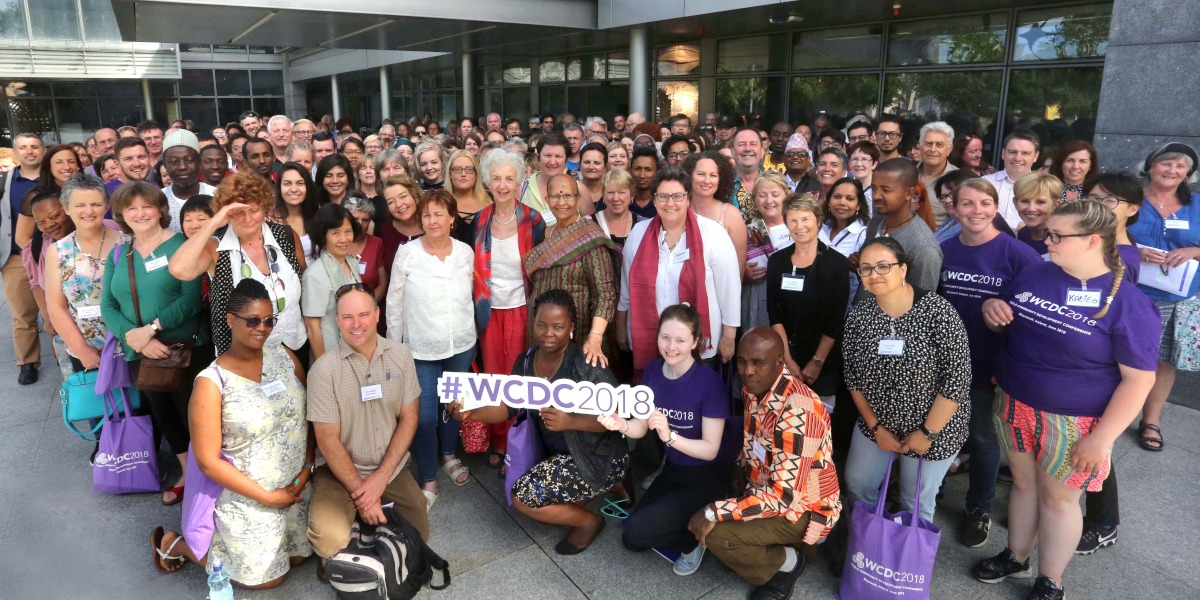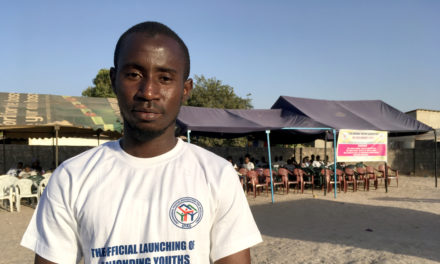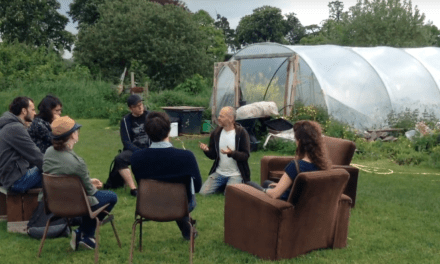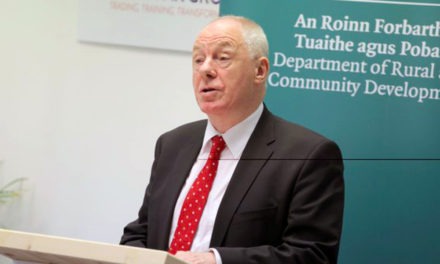After spending a couple of days at the 2018 World Community Development Conference in Maynooth, Kirsty Tobin shares the major takeaways from the event.
From 25-27 June 2018, community development workers from all over the globe descended on the small town of Maynooth, Co Kildare, for the World Community Development Conference (WCDC).
WCDC, held in the lecture theatres and classrooms of Maynooth University, brought together 400 people from 40 different countries to talk, learn and share experiences of community development under the topic of ‘Participation, Power and Progress: Community Development towards 2030’.
Attendees gathered en masse each day to hear plenaries and keynotes from some big names in community development – including former president Mary Robinson, activist Bernadette McAliskey, academic Yaser Alashqar, Community Work Ireland’s Rachel Doyle, academic Jim Ife, Dóchas CEO Suzanne Keatinge, and academic and activist Lynne Segal – before splitting into smaller groups for sessions and workshops.
Emerging themes
Over the three days of WCDC, a number of themes seemed to emerge. Attendees heard and talked again and again about social, economic and environmental justice, empowering women, and giving voice to the voiceless.
While many speakers and panellists touched on these issues, it was Mary Robinson – opening the conference with a talk on the connections between community development and climate justice – who spoke about them most succinctly.
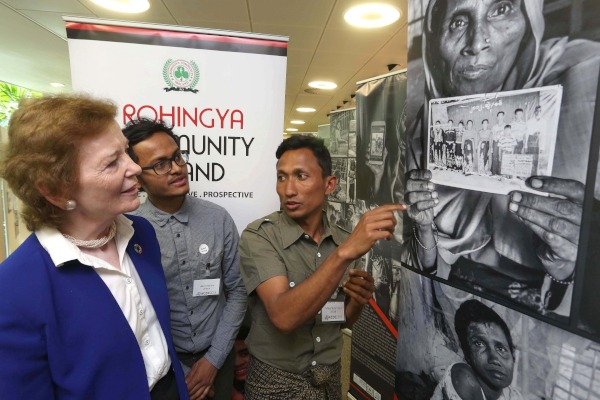
Former President of Ireland Mary Robinson meets Rohingya activists at the World Community Development Conference in Maynooth. Photo: Derek Speirs.
“Climate change and migration are the burning issues of the future,” said Robinson. “Climate change is a man-made problem which needs a feminist solution.”
Quoting Arundhati Roy, she highlighted the need to bring many voices to the table: “There’s really no such thing as the ‘voiceless’. There are only the deliberately silenced, or the preferably unheard.”
Intentional or not, giving voice to the voiceless was a theme that ran throughout WCDC.
Jim Ife spoke powerfully during his plenary talk (on humankind’s impact on the planet) about hearing non-white, non-male, non-Western voices: “I used to think that one of the differences between human rights and the rights of nature was that we can’t expect nature to articulate rights and demand rights in the ways that humans can. Then I realised that if we had only listened to Aboriginal people, to indigenous people, they would tell us, ‘Yes, nature does demand its rights. It’s just that we’ve forgotten how to listen’.”
Ife’s talk followed one given by Francisco Cali Tzay, a former president of the UN Committee on the Elimination of Racial Discrimination and, as one of the Mayan Kaqchikel people from Colombia, the first indigenous person to hold such a position. Cali Tzay spoke about the long hard struggle to ensure indigenous voices were heard in corridors of power and reminded attendees that it was impossible to talk about community development towards 2030 without including indigenous people in the discussion.
Grassroots energy
Another thread that ran through the entire conference centred on the recent referendum result. Rachel Doyle, joint national co-ordinator of Community Work Ireland, said during her plenary, that “the recent overwhelming vote to repeal the eighth amendment gives us great hope in the power of grassroots movements and the potential for change.”
This sentiment echoed through sessions and workshops over the three days, with many calls for community organisations in Ireland to capitalise not only on the results of the election, but also the enthusiasm with which both sides fought their corners.
For people from outside Ireland, the result meant something more. When asked why she had come to a panel on reproductive rights and feminism in community work, one American attendee replied with real emotion in her voice: “Things have been getting pretty dark at home. I’m here because I really need to find some hope.”
A call for more time
If there was one complaint that was prevalent throughout the conference it was that there wasn’t enough time – enough time for discussion, enough time to absorb, enough time to sit in on all of the interesting, informative sessions and workshops.
And yet it was impossible to leave Maynooth without gleaning at least something worthwhile, whether from individual sessions or on the whole. One of the most striking takeaways from the conference, for example, wasn’t the differences between practices around the world, but the similarities.
This was apparent in numerous presentations, but never more so than in one ringing statement from Kwon-Kin Fung, a Hong Kong-based academic and community worker: “One of the issues facing community workers and social workers in Hong Kong is a focus on paper work more than people’s work.” Murmurs of recognition and agreement filled the room.
More than a State of the Union – a clarion call
But WCDC was far more than a state of the community development union address – it was, as its overarching topic dictated, a look forward at how the sector needs to change and act in the next decade. As such, many speakers dotted their speeches with powerful words and almost revolutionary calls to action.
Bernadette McAliskey called out the “lurkers”, asking “What are any of us doing if we aren’t systematically working towards real social change? Are we becoming pacified by government partnerships? Are we becoming pacified by funding requirements?”
Mary Robinson took a feminist approach, stating “Increasing women’s participations in environmental planning leads to improved outcomes for everyone – the whole community benefits. We must tackle the complex barriers to meaningful women’s participations.”
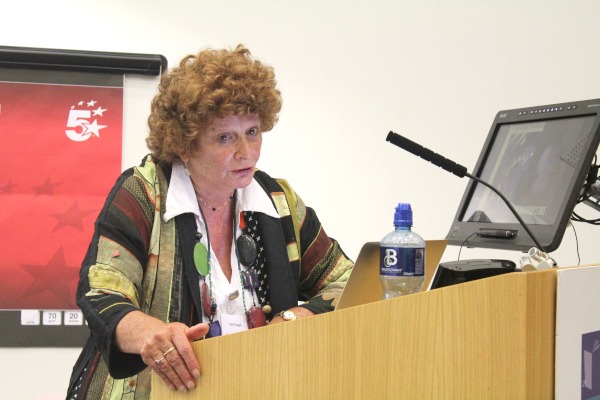
Lynne Segal delivers the closing address of the 2018 World Community Development Conference in Maynooth. Photo: Changing Ireland.
In a workshop on feminism and community work, Trish Brennan of the Women’s Council of Ireland reminded attendees that their job, as community workers, was to upset the apple cart.
Rachel Doyle warned against the pacification of community development workers: “I hope we’ll go home with fire in our bellies and enthusiasm to join the push back against complacency.”
Lynne Segal, who closed the conference, ended with a banner-waving moment – a moment that said the fight is far from over: “We have to refuse to abandon the desire to see real change, because that’s what all our enemies want us to do.”
Yet, in spite of this fire and spirit, the conference itself wound down on a more conciliatory note with the reading of the Maynooth Declaration, which ends:
“We reconfirm community development as a proven means of building a just, sustainable and peaceful world, and call on local, national, regional and global authorities and governments to recognise, support and sufficiently resource independent community work through appropriate political leadership, funding, policy and legislation.”
One thing is clear: with or without that government support, community developers won’t be going down without a fight.
If you’d like to attend the next World Community Development Conference, it will take place from 24-26 June 2019 in Dundee, Scotland.

